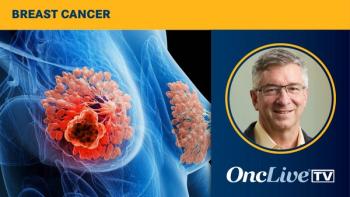
Implications for Systemic Therapy in Breast Cancer
Transcript:
Joyce O’Shaughnessy, MD: Well, thank you all for this great, great conversation. It’s fabulous. We have a brand-new approval to talk about here today. So before we wrap up, let’s each go down the table here and maybe just give us 1 take-home message that kind of struck you from our conversation that you just wanted to reiterate. Maybe start with you there, Ruth.
Ruth O’Regan, MD: I think it’s incredibly exciting to have a new regimen for triple-negative breast cancer, even though it’s 40% of the population. I think that’s just amazing, and hopefully we’ll see more data with that going down over the next year or so. I also think that the whole liquid biopsy platform is really exciting in terms of tailoring treatment going forward.
Kevin Kalinsky, MD, MS: So I think 1 of the take-home points is just what we talked about in terms of the KATHERINE data. I think when that study was reported in the New England Journal of Medicine, it was clear that this is a new regulatory path forward. So we have all these exciting new agents that are coming down the pike in various diseases: in HER2 [human epidermal growth factor receptor 2]—positive disease, antibody drug conjugates in triple-negative breast cancer. And it’s clear that for those patients with residual disease, that this 1 may give benefit but also is a good regulatory platform for bringing new drugs into the clinic.
Joyce O’Shaughnessy, MD: Yeah, that’s such a good point. What I also wanted to emphasize is that I have some patients now who had surgery up front for HER2-positive disease, had multiple positive nodes, and have had their TCHP [docetaxel, carboplatin, trastuzumab, and pertuzumab], including in the adjuvant setting, and I would like to very much give them T-DM1 [ado trastuzumab emtansine]. I’m doing peer-to-peers to try to get that, but it’s sometimes challenging to get that in the adjuvant setting…. As you said, Beth, it’s really become almost a responsibility now to make sure that these patients have the opportunity to get preoperative therapy, so we can see if they’re a path CR [pathologic complete response] or not and then give them the T-DM1 [ado trastuzumab emtansine]. I think that’s such an important kind of new approach that we really have to do.
Hope S. Rugo, MD: You have to say something different, something else. To me, CDK4/6 inhibitors, it’s great that we have the immune checkpoint inhibitor, but the majority of patients we see in the adjuvant, neoadjuvant, and metastatic setting have hormone receptor—positive breast cancer, HER2-negative. And we have these really well-tolerated drugs, 3 of them, that are incredible. I have a patient who relapsed at 3 years on tamoxifen. A young woman, node-positive disease, already in menopause, went on PALOMA-2 and she’s still on it at 5, almost 6 years, 5½ years. So we’re really changing the lives of our patients in a huge way, and this is a big population of patients. And that’s really exciting. So what I’m looking for is, what’s incredible to me is that we’ve already fully accrued 3 trials, 2 large adjuvant trials in high-risk patients and 1 post-neoadjuvant trial. And there’s yet another trial that is now actively accruing with another CDK4/6 inhibitor. So I’m hopeful that we’ll have adjuvant data in the not-too-distant future.
Joyce O’Shaughnessy, MD: Yeah. Beth?
Elizabeth A. Mittendorf, MD, PhD: Yeah, so it’s hard when you go last.
Hope S. Rugo, MD: But you’re the surgeon.
Elizabeth A. Mittendorf, MD, PhD: Well, even harder when you’re the surgeon and somebody has already taken neoadjuvant. Clearly I’m enthusiastic about increasing awareness in the surgical community about the importance of using a neoadjuvant platform to inform subsequent therapy. But as all of you know, 1 of my passions, of course, has been immunotherapy, and so this is a really exciting time. I look forward to the data we’ve been discussing that we anticipate will read out in the coming year but also what is now the challenge in trying to figure out how to best to incorporate immunotherapeutic strategies into our standard practices with our patients.
Joyce O’Shaughnessy, MD: Incredible progress in all the time that we’ve had to practice, you know what I mean? None of us can retire. We’re having too much fun. Well, thank you so much for your contributions. It’s really been fun talking to you all. On behalf of our panel, we thank you for joining us. We hope you found this OncLive Peer Exchange® to be useful and informative to your practice. Thank you.
Transcript Edited for Clarity




































